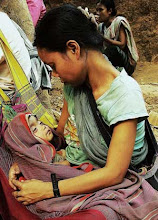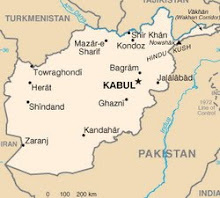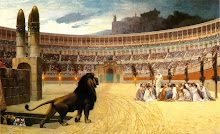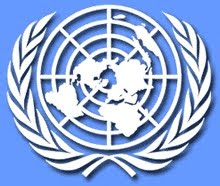 It was the kind of excitement that made children uneasy. Grownups were pointing toward the river. Others were arriving at a run. The bustling atmosphere in the market place of the peaceful African town of Nyamlell in the Dinka tribal area in the southern Sudan was changing. Worried adults could see what a seven-year-old Dinka boy, Francis Bok, who had gone to the market that fateful day with older village children to sell his mother’s eggs and peanuts, could not: “a storm of smoke” rising from a nearby village. Sellers frantically began to gather up their wares and hurry away with the buyers. The adults understood. They recognized the approaching signs of the dreaded scourge that most people believed had disappeared from the pages of African history long ago: a slave raid. It was 1986 and Bok was about to see his happy world of family and village shattered forever by a centuries-old, barbaric practice that has never died out: the violent capture and enslavement of black Africans by Arabs.“The Arab militias were told to kill the men and enslave the women and children,” said the now 28-year-old Bok, who was himself captured and enslaved that day, to an audience of 80 people at the University of Toronto recently where he had been invited to speak by the campus organization, Zionists at U. of T.Bok, who would spend the next ten years working as a child slave, then outlined for his college listeners in horrifying detail the savage hurricane of violence he next witnessed when the Arab slavers attacked.“I saw many people on the ground, shot…I saw people with their heads cut off with swords and shot in the head. People were lying on the ground like they just wanted to relax for a moment. I saw blood pouring like a small stream,” the 28-year-old Bok recounted in a voice that still quivers with emotion.Unknown to him at that time, Bok was also an innocent victim of the decades-long, savage civil war between Sudan’s Arab Muslim North and the country’s African Christian and animist South. Based in the capital, Khartoum, the North’s Islamist government, which also hosted Osama bin Laden in the 1990s, had promulgated sharia law in 1983 for the whole country in its quest to Arabize and Islamicize the non-Muslim South. Also as part of this goal, the Khartoum government armed Muslim militias and sent them in the 1980s and 1990s to wage jihad against the infidel southerners. However, the spears and hippopotamus shields of the South’s Dinka and Nuer tribes, the war’s main victims, were no match for the Kalashnikov-armed Muslims, who went on to kill two million southern Sudanese, displace another four million and take tens of thousands of slaves in a silent genocide.After the slave raid, Bok, a Christian, told the audience he was taken to the Muslim North to work for one of the Arab raiders’ families as a child slave for the next decade. During the pitiless trip north, the little Dinka boy witnessed the depth of racism, cruelty and religious hatred of his captors and their world towards black Africans when an Arab slaver cut off the leg of a Dinka girl who would not stop crying because she had seen her parents butchered in the market place. Upon his arrival at his master’s home, Bok was to experience himself this racial viciousness when he was immediately surrounded and beaten by the masters’ children who called him “abeed” (slave), an Arabic word also used for black Africans in general. And a slave Bok was in every sense of the word as he worked for his master without a day off and without payment for the next ten years, often laboring from four in the morning until after the family had gone to bed that night.“I was supposed to look after the goats; there were about two hundred goats,” Bok told listeners of his first days as a seven-year-old slave. “My master knew all the goats. He would ask: ‘Where is this goat? Where is that goat?’ If I answered: ‘I don’t know. He would beat me…He had a favorite stick to beat me. When I had done something wrong, even when I had done nothing wrong, he beat me.”Lonely and isolated, Bok said he was made to sleep in a shelter near the animals and was never allowed to talk to the Dinka slaves owned by other Arab families. The child slave even received a beating, Bok told the audience, when he asked his master one day why he calls him ‘abeed’ and why no one loves him. He was told never to ask that question again.The treatment Bok received from his master’s wife, however, was even worse. She would, he related, not allow her ‘abeed’ to look her directly in the face and would spit in his, often calling on her children to spit on the Dinka boy too.“That hurt,” said Bok. “I asked her why? She said: ‘You are my slave and this is my house.’ She would also grab a knife and say she would kill me like a chicken.”For ten long years, Bok told his listeners, he would lie awake at night and wonder who was going to come and free him from this hopeless, helpless life of a slave where he was told he was just an animal. Even his forcible conversion to Islam, outwardly in Bok’s case, did not bring any improvement in treatment. Only his faith in God, the Dinka slave stated, and his desire to see his parents again kept him going. “I hated the way they treated me and the way they treated the other slaves,” said Bok, recounting his humanity was never once recognized during all those years with the Arab family, his only value being the work he could do....
It was the kind of excitement that made children uneasy. Grownups were pointing toward the river. Others were arriving at a run. The bustling atmosphere in the market place of the peaceful African town of Nyamlell in the Dinka tribal area in the southern Sudan was changing. Worried adults could see what a seven-year-old Dinka boy, Francis Bok, who had gone to the market that fateful day with older village children to sell his mother’s eggs and peanuts, could not: “a storm of smoke” rising from a nearby village. Sellers frantically began to gather up their wares and hurry away with the buyers. The adults understood. They recognized the approaching signs of the dreaded scourge that most people believed had disappeared from the pages of African history long ago: a slave raid. It was 1986 and Bok was about to see his happy world of family and village shattered forever by a centuries-old, barbaric practice that has never died out: the violent capture and enslavement of black Africans by Arabs.“The Arab militias were told to kill the men and enslave the women and children,” said the now 28-year-old Bok, who was himself captured and enslaved that day, to an audience of 80 people at the University of Toronto recently where he had been invited to speak by the campus organization, Zionists at U. of T.Bok, who would spend the next ten years working as a child slave, then outlined for his college listeners in horrifying detail the savage hurricane of violence he next witnessed when the Arab slavers attacked.“I saw many people on the ground, shot…I saw people with their heads cut off with swords and shot in the head. People were lying on the ground like they just wanted to relax for a moment. I saw blood pouring like a small stream,” the 28-year-old Bok recounted in a voice that still quivers with emotion.Unknown to him at that time, Bok was also an innocent victim of the decades-long, savage civil war between Sudan’s Arab Muslim North and the country’s African Christian and animist South. Based in the capital, Khartoum, the North’s Islamist government, which also hosted Osama bin Laden in the 1990s, had promulgated sharia law in 1983 for the whole country in its quest to Arabize and Islamicize the non-Muslim South. Also as part of this goal, the Khartoum government armed Muslim militias and sent them in the 1980s and 1990s to wage jihad against the infidel southerners. However, the spears and hippopotamus shields of the South’s Dinka and Nuer tribes, the war’s main victims, were no match for the Kalashnikov-armed Muslims, who went on to kill two million southern Sudanese, displace another four million and take tens of thousands of slaves in a silent genocide.After the slave raid, Bok, a Christian, told the audience he was taken to the Muslim North to work for one of the Arab raiders’ families as a child slave for the next decade. During the pitiless trip north, the little Dinka boy witnessed the depth of racism, cruelty and religious hatred of his captors and their world towards black Africans when an Arab slaver cut off the leg of a Dinka girl who would not stop crying because she had seen her parents butchered in the market place. Upon his arrival at his master’s home, Bok was to experience himself this racial viciousness when he was immediately surrounded and beaten by the masters’ children who called him “abeed” (slave), an Arabic word also used for black Africans in general. And a slave Bok was in every sense of the word as he worked for his master without a day off and without payment for the next ten years, often laboring from four in the morning until after the family had gone to bed that night.“I was supposed to look after the goats; there were about two hundred goats,” Bok told listeners of his first days as a seven-year-old slave. “My master knew all the goats. He would ask: ‘Where is this goat? Where is that goat?’ If I answered: ‘I don’t know. He would beat me…He had a favorite stick to beat me. When I had done something wrong, even when I had done nothing wrong, he beat me.”Lonely and isolated, Bok said he was made to sleep in a shelter near the animals and was never allowed to talk to the Dinka slaves owned by other Arab families. The child slave even received a beating, Bok told the audience, when he asked his master one day why he calls him ‘abeed’ and why no one loves him. He was told never to ask that question again.The treatment Bok received from his master’s wife, however, was even worse. She would, he related, not allow her ‘abeed’ to look her directly in the face and would spit in his, often calling on her children to spit on the Dinka boy too.“That hurt,” said Bok. “I asked her why? She said: ‘You are my slave and this is my house.’ She would also grab a knife and say she would kill me like a chicken.”For ten long years, Bok told his listeners, he would lie awake at night and wonder who was going to come and free him from this hopeless, helpless life of a slave where he was told he was just an animal. Even his forcible conversion to Islam, outwardly in Bok’s case, did not bring any improvement in treatment. Only his faith in God, the Dinka slave stated, and his desire to see his parents again kept him going. “I hated the way they treated me and the way they treated the other slaves,” said Bok, recounting his humanity was never once recognized during all those years with the Arab family, his only value being the work he could do....To read more go to:
As in the days of Noah....


























.bmp)
No comments:
Post a Comment